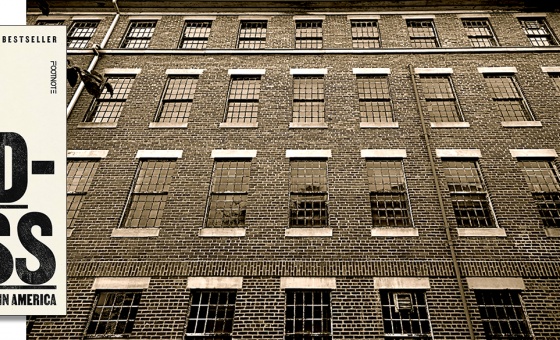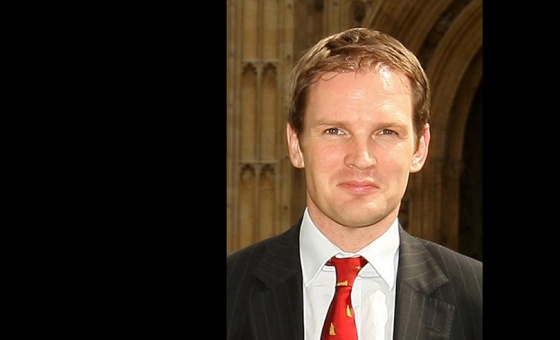This is the last article you can read this month
You can read more article this month
You can read more articles this month
Sorry your limit is up for this month
Reset on:
Please help support the Morning Star by subscribing here
AMONG the events this year marking the 150th anniversary of HG Wells’s birth — and the 70th anniversary of his death — Robert Lloyd Parry’s one-man adaptation of his sci-fi novella The Time Machine for Nunkie Productions is one of the stand-outs.
Published in 1895, Wells’s work popularised the concept of time travel and it’s a book that has had an enduring appeal.
There’s a plethora of film, TV and comic book versions of it and it’s a continuing source of fictional inspiration because, as Lloyd Parry enthuses, “it’s one of the great adventure stories. That’s why I enjoyed it when I was 13 and why it stuck in my memory.
“An ‘ordinary’ man finds himself pitted against monsters and has to protect a girl — broadly it’s the plot of so many of the myths and films that people have always enjoyed and always will.
“And there’s Wells’s brilliant imaginative twist of setting all these thrills in the far-distant future.”
It’s hard to credit today just how original the idea of a vehicle that can travel in time was when Wells published his story in 1895, Lloyd Parry says.
It wasn’t a novelty to speculate about the future, another ancient and enduring form of human entertainment. What was wholly original in Wells’s story was the means of travelling in time.
Yet Lloyd Parry insists that it isn’t “simply a great yarn.” Wells was passionately interested in how societies function, in the divisions that can come to exist between different human groups and what those divisions might turn into.
“His imaginative projections are as interesting, salutary and as relevant to our own time as they were to his,” he stresses.
The relevance of those projections — social commentaries on class, the natural world, technology and modernisation — meant that Parry didn’t have to make any significant changes to the narrative to make it reflect contemporary society.
“There were inevitable cuts,” he explains, “but I was more interested in correcting misconceptions about the original tale that people might have who only know the George Pal film from the 1960s.
“It’s enjoyable but it’s not an honest version of Wells’s story.”
He points to the relationship between the time traveller and Weena, the female Eloi — one of the two post-human races — who he teams up with, as being far more strange and ambiguous in the book than in the film.
“If the Time Machine is a love story at all it’s not the kind, one suspects, that Hollywood would ever dare to make today,” he says.
The challenges of adapting the book for a one-man show — which got rave reviews when it first toured a few years ago — were also less daunting than might have been anticipated.
“The bulk of the original novel is actually written in the first person,” explains Lloyd Parry. “The time traveller is telling a group of friends about his recent future experiences, so I kept the confessional, sometimes rather urgent, tone that was already there.
“The main challenge was not in condensing the narrative so much, as Wells’s sociological reflections and his observations about the future and how they relate to the past — or do I mean present?
“I felt that it would be doing Wells a great disservice to simply get rid of the more reflective passages, untheatrical though some of them may be. So I suppose the biggest challenge was finding the right balance between theorising about society and fighting troglodytes.”
Wells very much wrote for the page, so Lloyd Parry spent over a year dismantling and rebuilding the story, then writing and rewriting a script.
“I was racking my brains about how to make the scenes and adventures that the time traveller describes come alive theatrically with only one actor and I was determined from the beginning that there should be a time machine on stage,” he says.
That resolve is given rich dramatic life as the the play opens, with Lloyd Parry stumbling out of a giant metronome in dirty long johns and threadbare socks and it’s a production enhanced by the creative team responsible for props, sound and lighting design.
Lloyd Parry will be taking on more downsized performances of Wells when the tour of The Time Machine ends in October. As part of the anniversary commemorations, he’ll be doing a series of readings in science museums of Wells’s science-fiction shorts.
“There’s a brilliant one called The Crystal Egg — a kind of prequel to War of the Worlds — that I’m going to be doing at the Royal Observatory in Greenwich in November,” he says.
If his production of the Time Machine is anything to go by, that’ll be well worth checking out in the future — if it hasn’t already happened.
The Time Machine tours from September 17-October 15, details: nunkie.co.uk








